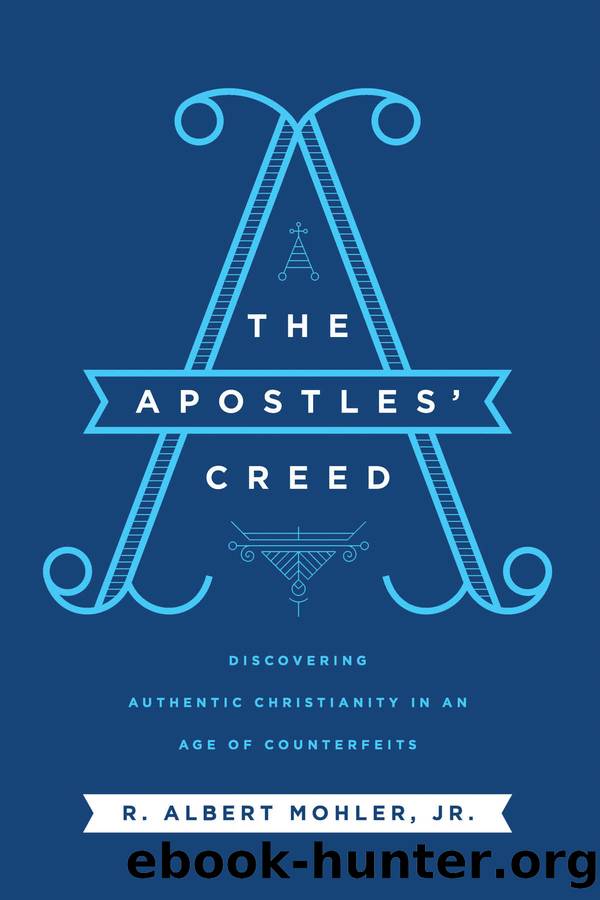The Apostles' Creed by Mohler Jr. R. Albert

Author:Mohler, Jr., R. Albert
Language: eng
Format: azw3, epub
Publisher: Thomas Nelson
Published: 2019-03-25T16:00:00+00:00
Theological Significance
To further illustrate the theological centrality of the resurrection, consider three dimensions of the theological significance of the resurrection. First, through the resurrection, Christians find justification. The Father justifies or vindicates the Son by accepting the sacrifice of the Son on behalf of Christians, and the Father demonstrates this vindication through the resurrection. Therefore, the resurrection provides proof that the atonement Jesus made was accepted by the Father (Rom. 4:24â25; Phil. 2:8â9).
Second, the Bible depicts regeneration as the result of resurrection power. Paul prayed that the Ephesians would know âthe immeasurable greatness of his power toward usâ and wrote that this power was revealed âwhen he raised him from the deadâ (Eph. 1:19â20). Also, in their union with Christ, the resurrection power transforms the life of the Christian into greater conformity with Christ (Rom. 6:3â5, 8; 1 Cor. 15:20â23; Eph. 1:18â20). Calvin helpfully characterized the resurrection in terms of both justification and regeneration:
Sin was taken away by his death; righteousness was revived and restored by his resurrection. For how could he by dying have freed us from death if he had himself succumbed to death? How could he have acquired victory for us if he had failed in the struggle? Therefore, we divide the substance of our salvation between Christâs death and resurrection as follows: through his death, sin was wiped out and death extinguished; through his resurrection, righteousness was restored and life raised up, so thatâthanks to his resurrectionâhis death manifested its power and efficacy in us.1
Indeed the New Testament, the source of Calvinâs theology, routinely applies resurrection terminology to the regeneration of the Christian. Peter, like Paul, associated regeneration language with Christâs resurrection. Christians were made âto be born again to a living hope through the resurrection of Jesus Christ from the dead.â Christâs resurrection provides the source of new spiritual lifeânew life is a sharing of Christâs resurrection life (1 Peter 1:3).
Third, the resurrection of Christ portends a great eschatological glorification of Godâs people. In fact, the resurrection of Jesus itself represents an eschatological event and signifies the beginning of the eschatological resurrection for all Christians:
Glorification is the final step in the application of redemption. It will happen when Christ returns and raises from the dead the bodies of believers for all time who have died, and reunites them with their souls, and changes the bodies of believers who remain alive, thereby giving all believers at the same time perfect resurrection bodies like his own.2
Paul indicated that the resurrection of Christ symbolizes the âfirstborn from the deadâ (Col. 1:18). As a result, Christâs resurrection foreshadows the corporate resurrection of his people. Also, Christâs resurrection is the âfirstfruitsâ of those who have fallen asleep (1 Cor. 15:20, 23), and the term âfirstfruitsâ (Rom. 8:23; 11:16; 16:5) guarantees that more will come. Furthermore, Jesus Christ, as the âlast Adamâ and âa life-giving spiritâ (1 Cor. 15:45), signifies that Christ is the creator of a new race of peopleâa people outside of the headship of Adam. Adam passed on
Download
This site does not store any files on its server. We only index and link to content provided by other sites. Please contact the content providers to delete copyright contents if any and email us, we'll remove relevant links or contents immediately.
What Is the Gospel? (Foreword by D. A. Carson) by Greg Gilbert(990)
Jesus in Me by Anne Graham Lotz(972)
Daily Strength: Devotions for Bible Believing Study by Douglas Stauffer & Andrew Ray & Rick Quatro(900)
Christian Ethics by Wilkens Steve;(860)
The Practice Is the Path by Tias Little(824)
New Morning Mercies by Tripp Paul David(810)
Cleaning Up Your Mental Mess by Dr. Caroline Leaf(741)
Veritas: A Harvard Professor, a Con Man and the Gospel of Jesus's Wife by Ariel Sabar(735)
Greatest Mystery in the World by Og Mandino(668)
The Creative Call by Janice Elsheimer(607)
No More Christian Nice Guy by Paul Coughlin(590)
Our Appointment with Life by Thich Nhat Hanh(576)
Monastic Archaeology by Unknown(569)
2084 by John C. Lennox(560)
This One Wild and Precious Life by Sarah Wilson(545)
Jesus--Awesome Power, Awesome Love (Discover 4 Yourself® Inductive Bible Studies for Kids) by Kay Arthur(535)
The Catholic Verses: 95 Bible Passages That Confound Protestants by Dave Armstrong(529)
The Duties of Parents by J.C. Ryle(519)
The Tale of the Tardy Oxcart (Swindoll Leadership Library) by Swindoll Charles R(507)
